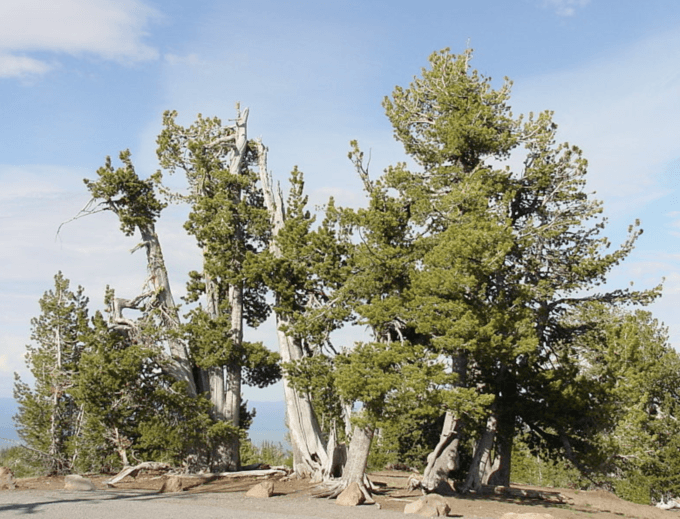Whitebark Pine. Photo: US Forest Service.
Many of you know about whitebark pine — the high-elevation, slow-growing, five-needled pine trees that provide a critical fall food source for many grizzly bears. Whitebark pine has a typical life span of up to 500 years, and sometimes more than 1,000 years. Whitebark pine tolerates poor soils, steep slopes, and windy exposures and is found at alpine tree line and subalpine elevations throughout its range. When whitebark pine grows above tree line, it grows in a krummholz form, which is a stunted, shrub-like growth.
Whitebark pine is a keystone, or foundation, species in western North America, where it increases biodiversity and contributes to critical ecosystem functions. For example, it may be the first conifer to become established after disturbance, and thus begins to stabilize soils and regulate runoff. At higher elevations, snow drifts form around whitebark pine trees, thereby increasing soil moisture, modifying soil temperatures, and holding soil moisture later into the season. Additionally, whitebark pine provides highly nutritious seeds for more than 20 species of vertebrates.
In particular, adult female grizzlies that eat more pine seeds have more surviving cubs than females who eat fewer pine seeds. Additionally, when pine seed crops are large, bears are found in whitebark pine stands – far from most humans. When seed crops are small, bears tend to forage for alternative natural foods at lower elevations closer to human developments. Thus, during the years when pine seeds are scarce, conflicts with humans escalate dramatically, as does the death rate among bears. In this way the availability of whitebark pine seeds is closely linked to the survival of grizzly bears in the Greater Yellowstone Area.
Back in 2011, the U.S. Fish and Wildlife Service concluded that whitebark pine faces so many threats to its survival that it needs Endangered Species Act protection. However, the government refused to formally protect the species and instead put whitebark pine on the waiting list. Now, nine years later, the government has finally issued a proposed rule to protect the species under the Endangered Species Act. However, a “proposed” rule does not necessarily mean that whitebark pine will receive a “final” rule for protection. Additionally, the government’s current proposed rule refuses to designate the population as “endangered” and refuses to designate “critical habitat” for whitebark pine. An “endangered” designation and formally protected “critical habitat” would create the strongest possible protections for this species. Furthermore, the agency has proposed a “4(d) Rule,” which would allow harmful logging activities to continue to occur in whitebark pine habitat. The proposed 4(d) rule would allow any and all “forest management” activities, i.e. commercial logging activities, to continue to occur on National Forest and BLM lands without protections for whitebark pine. The only way the government can implement this harmful “4(d) rule” is if it categorizes whitebark pine as “threatened” instead of “endangered.”
The Alliance will continue to fight for the strongest possible protections for whitebark pine, but we cannot do it alone. Please consider making a donation to the Alliance to help us fight to keep whitebark pine from going extinct and to CounterPunch for keeping the world informed about what our government is trying to do.
The proposed listing rule is available in the Federal Register at 85 Fed. Reg. 77408 (Dec. 2, 2020). The public may submit comments on the rule until February 1, 2021. The government needs to hear from you. Power concedes nothing without demand. Demand that whitebark pine receives the strongest possible protection — including:
(1) a listing as “endangered” not just “threatened,”
(2) “critical habitat” protection, and
(3) rejection of the proposed 4(d) rule to allow unlimited logging in whitebark pine habitat.
To submit your comments and supporting science, go to www.regulations.gov and enter FWS–R6–ES–2019–0054.
The post The Whitebark Pine Needs Your Help appeared first on CounterPunch.org.
PrintMike Garrity | Radio Free (2020-12-07T07:15:14+00:00) The Whitebark Pine Needs Your Help. Retrieved from https://www.radiofree.org/2020/12/07/the-whitebark-pine-needs-your-help/
Please log in to upload a file.
There are no updates yet.
Click the Upload button above to add an update.
